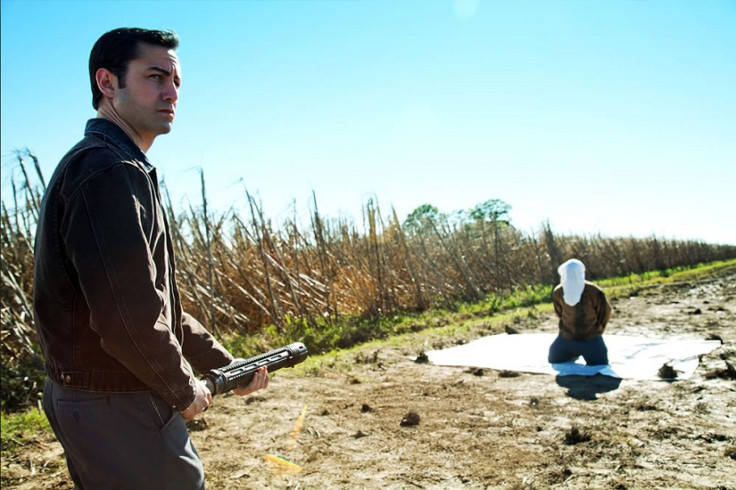‘Looper’ Movie Review: A Forward-Thinking Take On Time Travel

WARNING: The following review contains spoilers.
“Looper” begins in a desolate field where Joe (Joseph Gordon-Levitt) is counting seconds with an antique stop watch. He clutches an oddly shaped gun and aims it an empty tarp. Suddenly a bound and gagged figure appears out of thin air and Joe blasts him away.
The scene will likely appear in the future syllabi of freshman screenwriting courses as an example of an opening sequence worth imitating.
“Looper” is set in 2044 Kansas, a time not unlike the present. There have been no miraculous human advancements, robots have not replaced human activity and alien life forms have not invaded the planet. Like Steven Spielberg’s “Minority Report” or Alfanso Cuarón’s “Children of Men,” director Rian Johnson offers a dystopian vision of the future state of the world where poverty is rampant, drug addiction is common and many have to resort to prostitution or murder in order to survive.
In voiceover narration, Joe explains that 30 years further in the future, time travel has become possible, but it has been outlawed, available only on the black market. A ring of underground criminal organizations, led by a brutal figure known as The Rainmaker, use time travel to transport their victims to the past to be killed. This prevents their bodies from being identified at a time when individuals are so heavily tracked that disposing of a corpse is next to impossible.
Joe works as a looper -- a hit man in charge of killing those who have been sent back in time from the future. Since Joe grew up on the streets, this well-paying job allows him to work toward a better life. He’s saving up his earnings so he can move to Paris -- and he frequently practices French, even while carrying out an execution.
While the job provided temporary financial security, it has a serious downside: Eventually, all loopers must “close their loop,” meaning they must execute their future selves -- thereby eliminating all evidence of illegal activity. While all loopers are aware of this caveat, in most cases they are unaware they have closed the loop until immediately after the killing (as the identity of their victims is concealed), at which point they are congratulated with a hefty bonus.
After a looper closes his loop, he can only expect to live for another 30 years -- but as Joe notes, they aren’t the most “forward thinking people.” When Seth (Paul Dano), a fellow looper, is unable to go through with shooting his older self, he faces gruesome consequences at the hands of their boss, Abe (Jeff Daniels).
Shortly thereafter, Joe finds himself in the same predicament: He comes face-to-face with his future self (Bruce Willis), and during a moment of hesitation, his target escapes.
Joe subsequently confronts older Joe at a diner. He learns that in the future, The Rainmaker runs a legal ring of organized crime groups that have inflicted a reign of terror. Older Joe’s plan is to murder the deadly leader in 2044 while he is still a child.
Again, young Joe clumsily tries to end older Joe’s life -- making for one of “Looper’s” best scenes and putting it in a tie with “Haywire” for the year’s best cinematic diner scuffle.
After Joe fails to close his loop for the second time, he finds himself on the run from Abe and his gaggle of skilled assassins. He seeks refuge at a deserted farm house where Sara (Emily Blunt) is living with her son Cid (Pierce Gagnon). While the first portion of the film occurs in a decrepit urban city, its second act adopts a gentler, more pastoral tone.
The latter half of “Looper” somewhat strays from the central plot. We learn that older Joe believes Cid is The Rainmaker as a child and is determined to end his life. Young Joe remains on high alert as he waits to kill his older self the moment he arrives. Though these scenes deliver on suspense, one can’t help but feel denied an extended glimpse of the grim urban world Johnson introduces at the beginning of the film. The same may be said of the interaction between young Joe and older Joe. One of the film’s biggest disappointments is the underexplored dynamic between the two Joe’s: The fascinating diner scene setup never fully pays off, as the characters ultimately share few scenes together.
Johnson wrote the part of Joe expressly for Gordon-Levitt, who has made a career out of playing nonthreatening nice guys in feel-good films such as “(500) Days of Summer” and “50/50.” Though Joe is a drug-addicted killer who enjoys the company of prostitutes, Gordon-Levitt manages to make him likeable. The role required the actor to go through three hours of makeup each day so that he would better resemble Willis. Over the course of the film, Gordon-Levitt achieves an astonishing imitation of the actor, adopting his mannerisms and signature speaking style.
While “Looper” could have easily lent itself to hollow twists and gimmicks, Johnson concentrates solely on telling a riveting story. Much like his debut feature, the teenage noir “Brick,” also starring Gordon-Levitt, “Looper” is smart and engaging. Unlike the typical blockbuster, the film was made for a modest $30 million and is therefore low on CGI. This allows viewers to appreciate and absorb the narrative significance of the few special effects sequences in the film.
“Looper” is evocative of 1940s gangster films and blends elements of '70s-style horror films and classic Westerns. Following its critically lauded debut at the Toronto Film Festival, the film is set to join the ranks of such great time travel films as "Primer” and “Donnie Darko,” which have achieved cult-classic status.
© Copyright IBTimes 2024. All rights reserved.





















